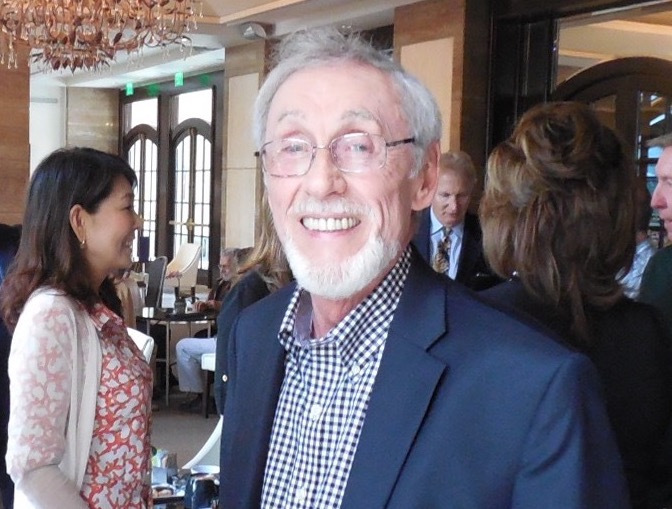Veteran TV executive Colin P. Davis died in his Toronto, Canada apartment on Friday, April 2, 2021 after a fatal fall. He was 91 years old. Davis is pictured above during the 2015 L.A. Screenings.
In 1986, Davis was appointed president of MCA International Television. Ten years later, he retired and moved to Bermuda. He divided his time between Bermuda, Toronto (where his only child Sharon lives), and Los Angeles. He traveled with a Canadian passport even though he had dual U.K. and Canadian citizenships.
In his 20 years with MCA and beyond, British-born Colin P. Davis saw the group, which was founded in 1924, going through a roller coaster of ownership changes.
However, Davis explained that he went through three out of the five ownership changes, before retiring.
Davis came from the TV sponsorship sector and joined MCA TV in Toronto in 1977, where he handled all licensing of television product produced by MCA-Universal Studios for English and French Canada.
Roger Cordjohn, who started at MCA TV in 1964 first in London and later in Paris, said, “Colin’s management style was visionary, inspirational and rewarding … and let’s not forget Davis’s unique sense of humor. He had excellent narration skills and enjoyed a good relationship with the trade press. Colin’s introductory presentations to our L.A. Screenings became a highlight for our clients, so much so that they were asking for copies of his speeches!”
In 1978, Davis moved to New York City as EVP of International for MCA TV, first under Ralph Franklin, who hired him. Later, in 1980, Davis transferred to Hollywood to work under Bob Bramson.
Davis was proud of being “one of the four executives who claim to have invented the ‘output deal’ in 1988,” although he declined to name the other three executives.
Davis also recalled how he didn’t like the name MCA TV because it “wasn’t clear to all that it was actually Universal Studios,” and at every occasion during trade shows, he would place a Universal sign under MCA TV in his stand. (From 1962 to 1995 MCA had been the parent company of Universal Studios.)
This reporter remembered a personal anecdote: “Colin’s booths were always on the main corridor of whatever trade show he participated at, and inevitably he’d be smoking outside his booths from the early mornings with a copy of one of VideoAge’s market dailies in hand.
“The biggest challenge for me was trying to avoid Colin in the morning, before his time was taken by meetings. This was because as soon he’d see me from a distance (while I was trying to hide), he’d signal to come to his booth, where he’d open pages of VideoAge Daily with paragraphs highlighted in yellow marker.
“Colin never complained about his own coverage, but in his usual frank and direct way, he’d start a diatribe on why we wrote negative comments, which, in his view, only papers like The New York Times were allowed to use. My stock answer was that VideoAge was like a mirror and reflected all the opinions that were out there. And if the answer did not satisfy him, I’d suggest he stop reading it and instead look at the photos, which always got a big laugh (with a cough) from him.”
Davis was known as an avid smoker (he eventually quit after a bout with several cancers, but his “devotion” to tobacco was legendary). Once, during a fire alarm, he barricaded himself in his Black Tower office in Universal City in order to finish his cigarette. After Matsushita took over MCA and banned all smoking inside the studios’ building, Davis would hide in the Tower’s garage in order to smoke: he wasn’t alone, but in the company of some Japanese executives.
Born in London, Davis worked in a bank after serving in the Royal Navy’s Air Force, where he was conscripted in 1948. In 1953, he was sent by the bank to its Toronto branch, which he left after a few years. In order to find a job, soon after he quit the bank post, he left for Chicago. He quickly returned to Toronto to join manufacturer Procter & Gamble Canada in 1956.
In 1960, Davis moved on to a position as media director in the Toronto office of the U.S. advertising agency Young & Rubicam (Y&R), where he established a TV department at the same time that Canada’s first private TV network, CTV, was created.


Leave A Comment